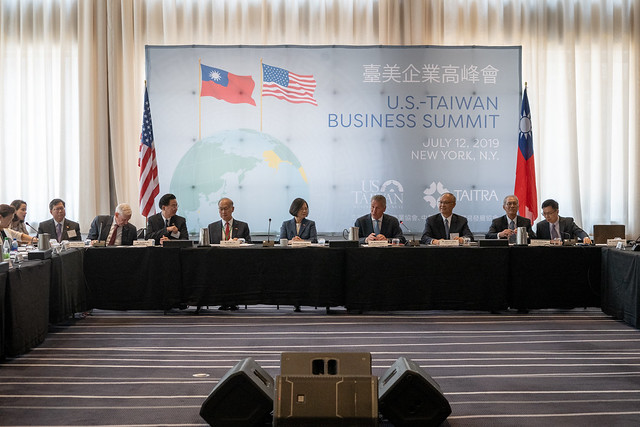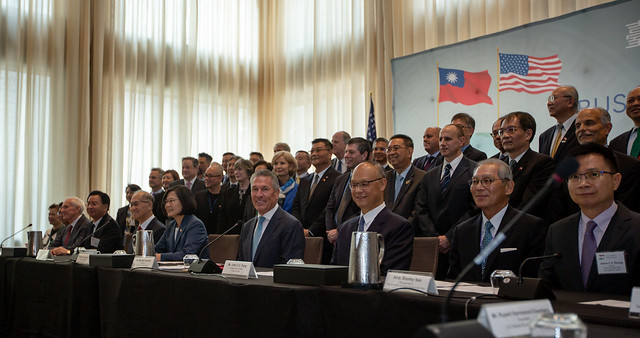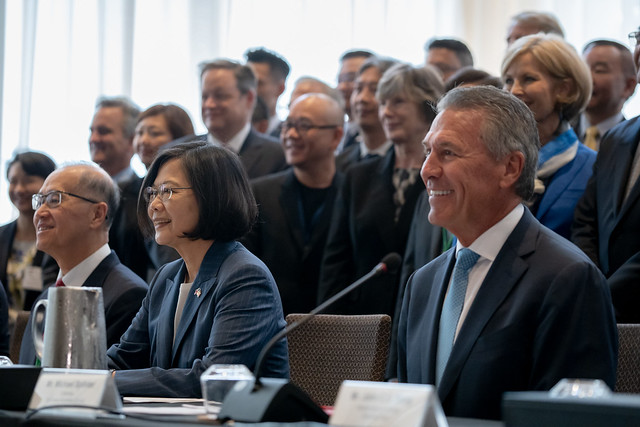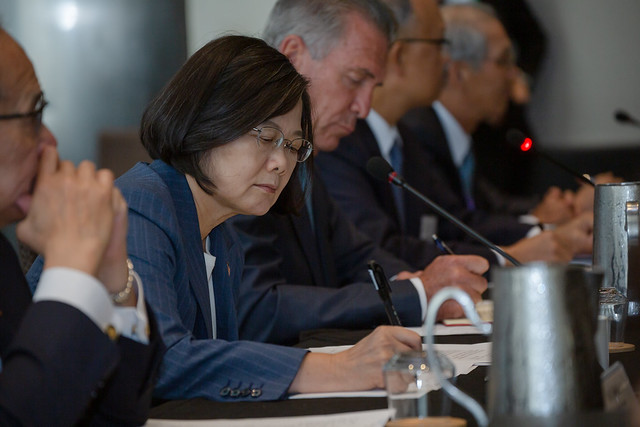News & activities
 News releases
News releases
President Tsai Ing-wen, currently traveling overseas on her Journey of Freedom, Democracy, and Sustainability, attended a Taiwan-US Business Summit in New York on July 12 at noon local time (midnight Taipei time).
Before the event began, President Tsai was escorted to the venue by Michael R. Splinter (Chair of the Taiwan US Chamber of Commerce and Chairman of the Board at NASDAQ) and Rupert Hammond-Chambers (President of the US-Taiwan Business Council, USTBC).
Before entering the venue, while responding to questions from reporters about the background of the meeting, President Tsai said she was pleased to be invited to attend this Taiwan-US Business Summit during her stopover in New York. Taiwan's economic and trade relations with the United States have grown stronger in recent years, and the total value of two-way trade has risen, which means that economic and trade ties between the two countries are growing closer. However, she added, against the backdrop of a changing international economic environment in recent years, industries and individual firms in both countries have met with challenges. But amidst those challenges, there have also been many potential opportunities. We hope to take advantage of today's meeting, she said, to discuss the challenges and opportunities that each side faces. And more importantly, we hope to identify opportunities for cooperation. The fact that she is attending this Taiwan-US Business Summit during her stopover in New York, said the president, shows the great importance that she attaches to the United States and to Taiwan's economic and trade relations with the United States. Hopefully, she added, we can continue to enhance these relations, and can also make more contributions to the Indo-Pacific region.
In his opening remarks at the summit, Chairman Splinter thanked President Tsai and her delegation for attending the event, and said that Taiwan's success in high technology has been stunning. Taiwan has an excellent investment climate, said the chairman, who expressed hope that the discussions at the summit will further strengthen Taiwan-US economic and trade relations.
Noting that the global economy is undergoing rapid change, Chairman Splinter stated that companies are all thinking about how to adjust their supply chains, and Taiwan has many advantages, especially in such fields as technology, ready-to-wear clothing, and pharmaceuticals. The chairman pointed out that the Taiwan government has always supported corporate development and has an excellent business climate, but noted that Taiwan is also in a complex environment due to US-China trade tensions. However, he said, this summit offers a platform to discuss the risks and opportunities associated with doing business in Taiwan.
Following Chairman Splinter's remarks, Minister without Portfolio John C. C. Deng (鄧振中) delivered remarks of his own. He thanked the Taiwan External Trade Development Council and the US-Taiwan Business Council for jointly holding the summit. He mentioned that the two countries share a commitment to democracy, freedom, and respect for intellectual property rights, and noted that their economies are complementary, which is why they have developed a lasting partnership characterized by deep mutual trust. The US economy continues to grow, hitting 3.1% growth for the first quarter of 2019. Taiwan's economy, meanwhile, is forecast by the IMF to grow 2.5% this year, and its stock markets are performing very stably. In particular, he said, a lot of offshore Taiwanese firms are choosing amidst the US-China trade war to shift their investments to Southeast Asia, the United States, and Taiwan.
Mr. Deng mentioned that Taiwanese investments in the United States are increasing annually, and Taiwan hopes to enter into a bilateral trade agreement with the United States to upgrade the cooperation and partnership between the two countries. He also expressed hope that Taiwan's friends in the United States will continue to support Taiwan, and he called on everyone at the summit to listen closely to the suggestions that business community representatives put forward during the proceedings.
In her closing remarks, President Tsai noted that we are commemorating the 40th anniversary of the Taiwan Relations Act this year, and that the foundations of Taiwan-US relations are our shared values and interests. Our shared economic, cultural, and people-to-people connections also bind us together, she said, and the summit showed just how intertwined our bilateral economic relationship has become.
The president then specially thanked USTBC for the fantastic work they have done to enhance this relationship. She noted that although Taiwan has a population of just 23 million, we are still the United States' 11th largest trading partner, and one of the largest per capita buyers of US agricultural products. Our supply chains, particularly in the ICT sector, are also deeply integrated, so as the focus of that day's discussions outlined, our economic and industry ties are closer than ever.
The president also mentioned that over the years, Taiwanese and US businesses have always worked closely together as the most trustworthy and reliable of partners, and that enterprises at the summit who have done business with Taiwanese firms have certainly discovered that they are extremely dependable partners. Our commitment to the sustainability of our relationship, she said, has never wavered. Each year, Taiwan organizes one of the largest investment delegations for SelectUSA, and we send annual agricultural trade goodwill missions to the US to bring some of America's best and freshest produce to Taiwan. In particular, over the past two years we were pleased to announce a number of new deals in energy, one of our fastest growing areas of cooperation.
The president said that the summit discussions gave her and her administration lots of ideas on how we can further expand and deepen this relationship. Taiwanese and US companies now face many of the same challenges given the current trade environment, and we are conscious of the effect that changing supply chains and global trade trends have on deeply interconnected industries such as the ICT sector.
But as the summit discussions made clear, these risks also bring opportunities. We see further cooperative possibilities through new partnerships, supply chains, and ensuring company-to-company trust, she said, and further integration of our economies will work to maintain a rules-based trading system that has sustained us well through the years.
President Tsai also stated that another purpose of the summit was to seek further opportunities for Taiwanese companies to invest in the United States while attracting more US companies to invest in the Taiwan market. "I think we've accomplished that," she said.
She then said that encouraging two-way investment continues to be a top priority for her administration. Taiwan's free business environment sets us apart from some of our neighbors in the region, and ties us closely with the United States. In Taiwan, rule of law is well-established, we protect intellectual property, and have a friendly regulatory environment.
Over the past three years, she said, my administration has continued to make it simpler to hire, do business, and expand operations in Taiwan by further relaxing unnecessary regulations.
This year the Heritage Foundation has also ranked Taiwan as one of the best places to do business in Asia, ranking 10th in the world in terms of economic freedom. As two of the architects of many of these policies, Minister of State John C.C. Deng and Vice Minister of Economic Affairs Wang Mei-hua (王美花) were on hand, the president invited the summit attendees to direct their questions to them at the reception following the summit meeting.
President Tsai closed her remarks by once again thanking Chairman Splinter, and TAITRA for their efforts putting the event together. She then said she looks forward to having the opportunity to welcome all of the attendees to Taiwan in the near future.
The summit was attended by over 35 US and Taiwan enterprises and organizations, including representatives from US and Taiwan firms from a wide range of industries such as the internet of things, technology, energy, electronics, healthcare, biotech, finance, investment consulting, smart transportation, and materials science, as well as American Institute in Taiwan Chairman James Moriarty.












